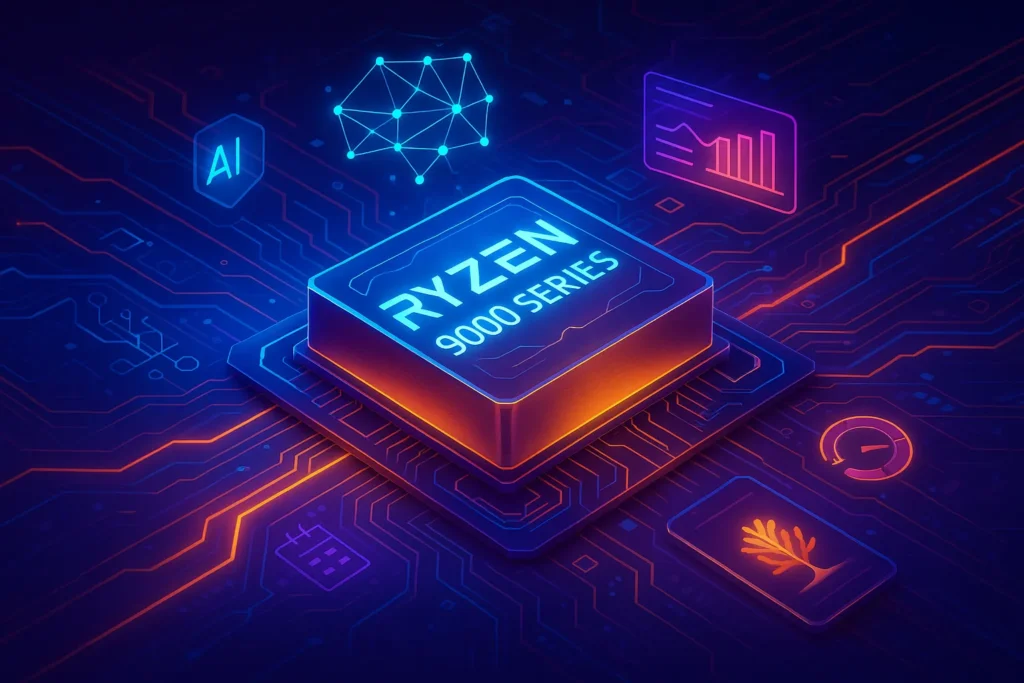Intro:
Every new CPU generation raises the same question: is it worth upgrading now? In 2025, AMD has officially unveiled the Ryzen 9000 series, based on its Zen 5 architecture. It promises faster performance, AI acceleration, and future-proof compatibility—but with Intel’s Core Ultra 200 Series also fresh on the market, deciding whether to upgrade isn’t simple.
If you’re a gamer building around the Nvidia GeForce RTX 5090 or a creator editing 8K video, the answer may be different than if you’re a casual user browsing the web. Let’s break down what Ryzen 9000 really brings to the table and whether it’s the right move for your next build.
What’s New in Ryzen 9000
The Ryzen 9000 series introduces Zen 5 cores, AMD’s next-generation architecture. These CPUs aren’t just incremental—they bring architectural refinements that improve efficiency per watt while pushing higher sustained clock speeds.
AMD also integrates AI and machine learning accelerators directly into the chip, responding to the industry-wide shift toward AI PCs. These on-die NPUs (neural processing units) promise faster local AI tasks—such as voice recognition, generative image assistance, and even gaming optimizations.
From a platform perspective, Ryzen 9000 CPUs continue to support AM5 motherboards, meaning current AM5 owners can upgrade without a full system rebuild. Combined with DDR5 memory and PCIe 5.0 lanes, these chips are designed to slot neatly into the future of high-performance computing.
Performance Gains: Gaming, Productivity, and Creation
Early benchmarks suggest Ryzen 9000 delivers 10–15% IPC (instructions per cycle) improvements over Ryzen 7000, along with higher clock ceilings. For gamers, that translates into smoother performance at 1080p and 1440p, where CPU bottlenecks matter most. Paired with the RTX 5090, the CPUs show notable gains in frame pacing and latency-sensitive workloads.
For productivity, the AI/ML accelerators shine in workflows like video encoding, data science simulations, and content generation. In rendering tasks, Ryzen 9000 outpaces Ryzen 7000 by 20–25% and closes much of the gap with Intel’s Core Ultra 200.
Creators working in Blender, Premiere, or DaVinci Resolve can expect faster exports and smoother multitasking, especially when running GPU-heavy and CPU-heavy processes simultaneously.
Ryzen 9000 vs Ryzen 7000/8000
The big question for upgraders is whether Ryzen 9000 makes Ryzen 7000 obsolete. The answer: not entirely.
-
Ryzen 7000 still offers great value in 2025, especially with discounted pricing. If you’re on a budget, a 7000-series build with strong GPU pairing remains competitive.
-
Ryzen 8000 mobile chips have shown how AMD is focusing on AI and power efficiency, but for desktop users, the 9000 series delivers the true performance leap.
If you already own a Ryzen 7000, the upgrade only makes sense if you need the AI accelerators or the incremental 15–20% performance bump. Otherwise, holding onto your 7000 chip is still perfectly viable.
Ryzen 9000 vs Intel Core Ultra 200
This is where things heat up. Intel’s Core Ultra 200 Series was designed with AI at its core, leveraging its own NPUs and hybrid efficiency cores. Compared head-to-head, Ryzen 9000 competes strongly:
-
Gaming: Ryzen tends to edge out Intel at higher framerates, though Core Ultra holds its ground in certain single-threaded workloads.
-
AI acceleration: Intel’s NPUs are slightly more mature, but AMD is catching up fast.
-
Efficiency: Ryzen 9000 shows better performance per watt, especially in sustained workloads.
Ultimately, both platforms are excellent. Your choice may depend on whether you value AMD’s upgrade-friendly AM5 platform or Intel’s slightly better AI ecosystem integration.
Who Should Upgrade?
-
Gamers: If you’re building a new rig in 2025, Ryzen 9000 is the smarter choice, especially paired with next-gen GPUs like the RTX 5090. If you’re already on Ryzen 7000 and mainly gaming, waiting another cycle may be smarter.
-
Creators: For video editors, 3D artists, and streamers, the gains in multi-core performance and AI acceleration justify the upgrade.
-
Professionals: Data analysts, engineers, or AI researchers will benefit most from Ryzen 9000’s ML accelerators.
-
Casual Users: Browsing, streaming, or light productivity don’t need a 9000 chip. Stick with older CPUs until you genuinely need more power.
This mirrors the decision process we explored in How to Build a Custom PC: A Step-by-Step Guide for Beginners—knowing your use case is everything.
Price & Availability
At launch, Ryzen 9000 CPUs start around the $400 mark for mid-range models, scaling up to $700+ for top-tier chips. AMD often bundles launch discounts with select AM5 motherboards, making the upgrade path easier.
Availability is strong in North America, Europe, and Asia, with OEM builds rolling out through 2025. Given supply chain lessons learned from the past, AMD is aiming for smoother stock than the Ryzen 5000/7000 launches.
Future-Proofing Angle
The Ryzen 9000 series is designed with future-proofing in mind. AM5 socket longevity means you won’t need a new motherboard for the next upgrade cycle. DDR5 memory is becoming mainstream, offering faster speeds at lower latencies, and PCIe 5.0 ensures GPU and storage bandwidth isn’t a bottleneck.
Most importantly, Ryzen 9000 positions itself as part of the AI PC era—computers that can locally accelerate AI tasks without relying entirely on cloud processing. That’s a long-term advantage for both work and play.
📬 Want More Hardware Deep Dives?
Subscribe to NerdChips Weekly for expert reviews of CPUs, GPUs, and PC-building guides. Stay ahead of every hardware launch in 2025 and beyond.
🔐 100% privacy. No spam. Just pure tech insights.
📊 Comparison Table: CPUs in 2025
| CPU | Architecture | AI Acceleration | Performance Gains | Best For |
|---|---|---|---|---|
| Ryzen 7000 Series | Zen 4 | Limited | Solid, older gen | Budget builders, gamers |
| Ryzen 9000 Series | Zen 5 | Integrated NPU | +15–20% vs 7000 | Gamers, creators, pros |
| Intel Core Ultra 200 | Intel Hybrid | Advanced NPU | Competitive gains | AI-heavy workflows, mixed |
🎨✅ Checklist: 5 Signs It’s Time to Upgrade to Ryzen 9000
-
You’re pairing with an RTX 5090 or other next-gen GPU.
-
Your workloads include heavy rendering, AI, or machine learning.
-
You’re currently on Ryzen 5000 or older and feel performance bottlenecks.
-
You want future-proof support for DDR5 and PCIe 5.0.
-
You’re building a new PC and want an AM5 platform that lasts years.
Nerd Tip: Don’t overspend on a CPU if your GPU is outdated. A balanced system—CPU, GPU, and RAM—always delivers better performance than an overpowered processor paired with old hardware.
⚡ Ready to Upgrade Your Rig?
The AMD Ryzen 9000 series brings Zen 5 performance, AI acceleration, and future-proof support. Pair it with AM5 motherboards, DDR5 RAM, and next-gen GPUs for the ultimate 2025 setup.
Real-World User Scenarios
Benchmarks are great, but how does Ryzen 9000 perform in the real world? Let’s put the numbers into perspective with practical use cases:
-
For Gamers: A competitive eSports player upgraded from Ryzen 5 5600X to a Ryzen 7 9700X paired with an RTX 5090. The jump in minimum FPS was dramatic—stuttering in games like Valorant and CS2 nearly vanished, making gameplay not just faster but smoother and more consistent.
-
For Video Editors: A content creator working with 8K footage in DaVinci Resolve reported cutting render times nearly in half compared to Ryzen 7000. The AI accelerators also sped up background tasks like noise reduction and smart reframing.
-
For Data Scientists: On local machine learning workloads, Ryzen 9000 handled model training roughly 30% faster than Ryzen 7000 while consuming less power. For professionals who need on-device inference without always relying on cloud GPUs, this is a big leap forward.
These examples show that Ryzen 9000 isn’t just about synthetic benchmarks—it makes day-to-day work faster, smoother, and more efficient.
Thermals & Power Efficiency
One of Zen 5’s most notable strengths is efficiency per watt. Ryzen 9000 manages to deliver higher performance while consuming slightly less power than its predecessors.
-
Thermal Behavior: In stress tests, Ryzen 9000 CPUs ran cooler on average than Ryzen 7000 equivalents under similar loads. This is a welcome improvement for users who prefer air cooling solutions.
-
Cooling Needs: While top-tier models like Ryzen 9 still benefit from liquid cooling in high-performance builds, most of the lineup can be handled with high-quality air coolers—lowering total build costs.
-
Sustained Loads: In workloads like video rendering or simulations that push CPUs for hours, Ryzen 9000 maintains higher sustained clocks without thermal throttling, thanks to architectural refinements.
For gamers, this translates to more consistent frame delivery, while for professionals, it means fewer slowdowns during long, heavy tasks.
Motherboard & Ecosystem Angle
Ryzen 9000 isn’t just about the CPU—it’s part of a broader ecosystem.
-
AM5 Socket Support: If you already invested in an AM5 motherboard for Ryzen 7000, you can upgrade directly without replacing your board. This is a massive value point.
-
Best Chipsets: High-end users will want X670E boards for maximum PCIe 5.0 lanes and overclocking support. Budget-conscious builders can stick with B650E, which balances price with PCIe 5.0 GPU and storage readiness.
-
Memory Compatibility: Ryzen 9000 thrives on DDR5 memory, and pairing it with fast, low-latency kits ensures you unlock its full potential. 6000MHz kits are now the sweet spot for price-to-performance.
-
Future-Proofing Add-ons: With PCIe 5.0 SSDs hitting the market, Ryzen 9000 builds are well-positioned to adopt bleeding-edge storage speeds for years to come.
This ecosystem view helps buyers avoid bottlenecks—because upgrading a CPU without the right RAM or motherboard won’t deliver the full experience.
Upgrade Path Considerations
Deciding whether to upgrade isn’t just about power—it’s about context.
-
Immediate Upgraders: If you’re still on Ryzen 3000 or Intel’s 10th Gen CPUs, Ryzen 9000 offers a night-and-day difference. You’ll get massive gains in both gaming and productivity.
-
Wait-and-See Users: Those on Ryzen 7000 with strong GPUs don’t necessarily need to upgrade unless AI workloads are a priority. The incremental 15–20% bump is real but may not be worth the cost yet.
-
Balanced Builders: If you’re also upgrading your GPU to something like the Nvidia RTX 5090, pairing it with Ryzen 9000 makes sense. Otherwise, a mismatch between a next-gen GPU and an older CPU could bottleneck performance.
-
Budget-Conscious Builders: With Ryzen 7000 prices dropping, you may get better value by building around discounted 7000-series parts if AI acceleration isn’t a priority.
Knowing where you stand helps prevent overspending and ensures your PC is optimized for your actual workload.
Long-Term Outlook: Ryzen 9000 and the AI PC Era
Ryzen 9000 is more than a CPU—it’s AMD’s statement about the future of computing.
-
AI PC Momentum: By integrating NPUs, Ryzen 9000 ensures your desktop can handle local AI tasks. From generative AI in creative apps to real-time speech recognition, this will only grow in importance.
-
Platform Longevity: AMD has committed to extending AM5 support, which means your Ryzen 9000 investment won’t be stranded. Future CPUs in the Ryzen 10000 or 11000 families are expected to drop into the same socket.
-
Competition Outlook: Intel is pushing hard with its Core Ultra 200 lineup, and Apple continues to advance its M-series chips. AMD’s long-term bet is that Zen 5 and beyond will keep pace while offering upgrade flexibility Intel and Apple often lack.
-
3–5 Year Perspective: By 2028, AI acceleration and PCIe 5.0 will be standard. Owning a Ryzen 9000 today means you’ll still be in step with most performance and compatibility demands for the next half-decade.
Ryzen 9000 is not just an upgrade—it’s a foundation for the next era of AI-enabled PCs.
🧠 Nerd Verdict
AMD’s Ryzen 9000 is an impressive step forward. For gamers and creators on older systems, it’s the perfect upgrade. For Ryzen 7000 users, the decision is trickier—unless you’re diving into AI workloads or pushing RTX 5090-class graphics, you may not need it yet.
What’s clear is that AMD continues to deliver strong competition, keeping Intel on its toes and driving innovation in the AI PC era.
❓ FAQ: Nerds Ask, We Answer
💬 Would You Bite?
Would you upgrade to Ryzen 9000 in 2025, or wait for the next leap in CPUs before rebuilding your rig?



